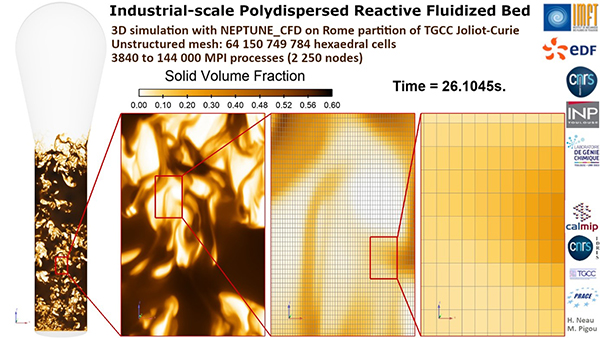 |
||
Home > TERATEC FORUM > Workshops > Workshop 3
Teratec 2022 Forum
Wednesday, June 15 - Application Workshop
Workshop 03 - 9:00 to 12:30 pm
HPC and computer codes:
a constantly evolving ecosystem
Chaired by Cyril BAUDRY, Architecte SI scientifique, EDF R&D et Jean-Albert Vilmer, Regional Director EMEA South, MSC Software Hexagon
Mesh refinement and result interpolation to reach Exascale with Neptune_CFD
By Hervé Neau, Research engineer in scientific computing, IMFT
|
Up until 2018, largest simulations performed with the Computational Fluid Mechanics software for reactive multiphasic flows, NEPTUNE_CFD, used unstructured meshes of up to 108 million cells with 12 000 CPU cores. To prepare for upcoming Exascale systems and follow the always-increasing scale of simulations, we setup a team of research engineers, researchers, supercomputing center support engineers and EDF developers. Our strategy relied on automated mesh refinement coupled with the interpolation of latest time step results onto the new refined mesh. We started with a 25s physical-time simulation using a 1 billion cells mesh on the entirety of Olympe (CALMIP) and Gaïa (EDF) supercomputers. By following our strategy, we extended this simulation from the 25s checkpoint file but with an 8 billion cells mesh on Jean-Zay supercomputer at IDRIS. Finally, this approach has been further extended up to 64 billion cells with the whole Irene-AMD supercomputer at TGCC. Unfortunately, further refinement of the mesh from 64 up to 512 cells did not work, yet. This approach allows to solve initial transient conditions on a coarse mesh while still obtaining accurate results on established regime. Overall, this proved to be an efficient methodology which significantly reduces the cost of largest-scale simulations.
 |
Biography : Hervé Neau is CNRS Research engineer in scientific computing since 1999 at the Toulouse Institute of Fluid Mechanics (IMFT). He is head of support/computation team “Codes et Simulations Numériques” and responsible of the “Computation and Data” department of Toulouse INP university. He is a HPC expert in the domain of Computational Fluid Dynamics, especially with the NEPTUNE_CFD multiphase solver. He works closely both with researchers, solver developers, and support teams of national HPC center (CALMIP, CINES, IDRIS, TGCC). He organizes and also carries out training sessions on HPC topics (CFD pre/post processing, large data visualization) for the regional academic public.
IMFT is one of the most important French fluid mechanics laboratory. Its research covers a large range of application Engineering Sciences (nuclear engineering, petroleum engineering, aeronautics and space, land transport, combustion and reactive media, energy and matter transformation), life mechanics and environmental fluid mechanics. |
Register now and get your badge here
- TERATEC Forum is strictly reserved for professionals.
- Participation to exhibition, conferences and workshops is free (subject to seats available)
- On line registration is obligatory.
